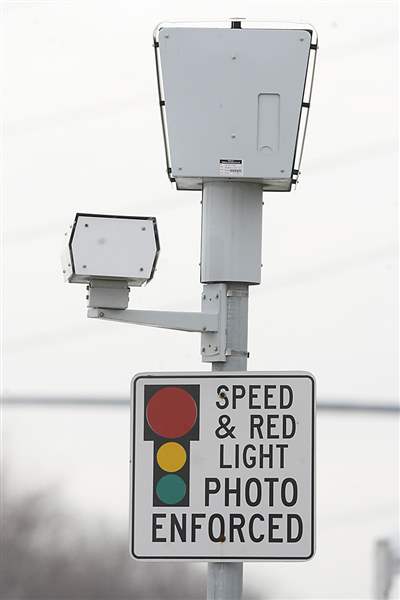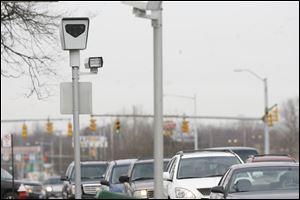
Ban on red-light cameras fought
Cities fight proposal to outlaw use, urge statewide standards
11/14/2013
Toledo has been using red-light cameras since 2001 and wants to prevent a state ban on their use.
THE BLADE
Buy This Image

Toledo has been using red-light cameras since 2001 and wants to prevent a state ban on their use.
COLUMBUS — Rather than outlaw them because of the abuse of a few cities, Toledo and other municipalities that rely on red-light and speed-enforcement cameras urged lawmakers on Wednesday to instead enact statewide standards for their operation.
Sen. Kevin Bacon (R., Columbus) proposed legislation that would require police officers to approve each civil citation, require safety studies of intersections before cameras are installed, and assure that drivers have a way to challenge a citation.
Toledo police Lt. Jeffrey Sulewski said those standards are basically what Toledo has done since the program’s inception in 2001.
“All of the cities in Ohio that use Redflex as their vendor, which Columbus and Toledo do, are programs that are pretty much set up the same,” he said. “We use the same standards in how we operate. ... I believe our programs pretty much mirror each other, and that’s what we’re supporting.”
The bill could serve as a pre-emptive strike against House Bill 69, which would ban red-light cameras and limit the use of speed cameras to 20 mph school zones.
Even then, the school-zone cameras could be used only when a police officer is present to witness the violation.
The bill passed the House by a bipartisan vote of 61-32 last spring. The Senate has not acted on it.
Mr. Bacon serves on the Senate committee considering the bill. He’s offering standards as an alternative.
“I think the more [legislators] hear, the more they understand, the more open they are to accepting a bill such as this instead of banning them,” he said. “Once you get into this, you realize it’s saving lives.”
Traffic cameras have been under attack before but have managed to survive.
Supporters of a ban contend the cameras are more about generating revenue than they are about safety.
The current backlash was caused by Elmwood Place, a village near Cincinnati where a camera program was shut down by a judge, who declared it to be a “scam that the motorists can’t win.”
When asked during a recent Senate committee hearing whether he would accept uniform standards in lieu of an outright ban, one of the bill’s sponsors, Sen. Dale Mallory (D., Cincinnati), said, “This situation has already spun out of control. ... We need to stop it in its tracks.”
Toledo, Columbus, Springfield, and other cities represented at Wednesday’s news conference insist the cameras are not about revenue, otherwise they would be installed at the busiest of intersections rather than those with the most safety problems.
Both sides cite conflicting studies as to the safety benefits of the cameras.
Toledo and 14 other municipalities operate such cameras.
Unlike a criminal violation witnessed by a police officer, a violation caught by a camera is a civil offense that results in a fine. No points are assessed against a driver’s license and insurance companies are not notified.
Toledo took in nearly $3 million in 2012 and had predicted $4.2 million this year. Camera citations in the city cost $120, of which $90.25 goes to the city. Northwood in Wood County recently ended its program.
Contact Jim Provance at: jprovance@theblade.com or 614-221-0496.